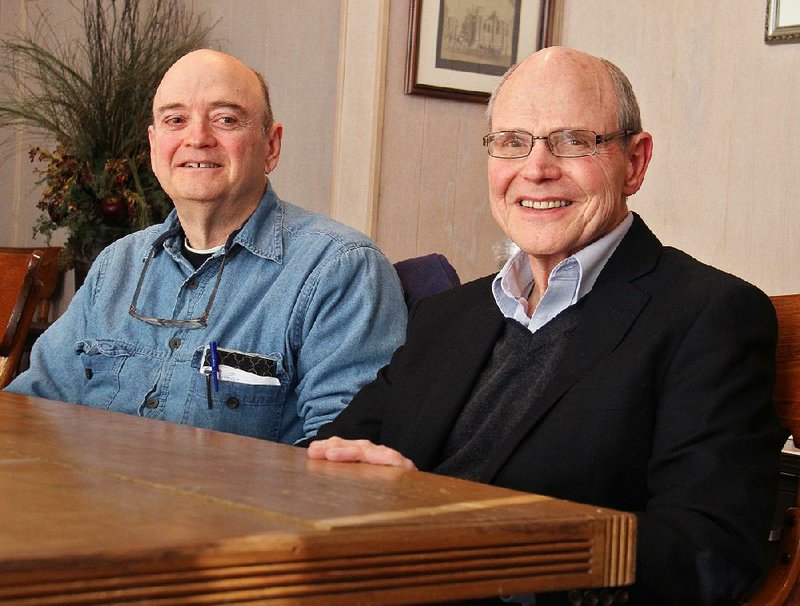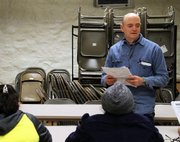About a dozen parishioners from Central and South America hunch over assessment tests in the basement of downtown Little Rock's St. Edward Catholic Church, working toward a shared resolution. In 2015 they plan to learn English, with the help of two other parishioners, Dale Pekar, 65, and Al Schneider, 71, who spearhead the church's English-as-a-second-language program.
"Our pastor really wanted us to get engaged on issues of social justice and community outreach," says Schneider, who heads St. Edward's social concerns committee. "A Latino member of our committee said, if we want to look at an issue that is really big in our parish, it's the issue of immigration. We started wrestling with what we could do to address that."
Schneider approached Literacy Action of Central Arkansas, which was founded in 1986 to teach reading and language skills to adults. The nonprofit agreed to train St. Edward's tutors and provide teaching materials. Ten English-speaking parishioners signed on as tutors.
The first 10-week program began with 25 students. Before the session ended, there were 37. Since then, there have been two other sessions. Most students have attended all three, testing into the next level every 10 weeks.
Through Literacy Action, Pekar became an AmeriCorps volunteer, which means he commits 20 hours a week to the ESL program. Classes meet twice a week for an hour and a half, and in January's new session, Pekar will introduce morning and afternoon classes, in addition to the ongoing evening classes. That way night workers, such as restaurant employees, will be able to attend.
Thus far, the ESL students have been mostly women in their 20s through 40s. At registration a few sessions back, Schneider was struck by disparity in the students' histories. The woman on his left had a university education and was once a teacher herself, in Mexico. The woman on his right attended school through junior high and worked as a housekeeper. But the housekeeper spoke basic English and was running her own small business, while the other woman had just arrived and spoke no English.
The tutors range in age from their 20s through 70s and include a nurse, a lawyer, a schoolteacher and retirees. For the most part, they don't speak Spanish. Pekar says when they "hit a bump," there's usually another, more advanced student around who can say, "This is what it is in Spanish."
According to Schneider, 70 percent of the 2,333-member St. Edward parish is Hispanic. "We're looking to not only raise English proficiency ... we're looking to bridge gaps between parishioners," he says. "In some ways, we have two different parishes using the same facilities."
But the ESL program isn't just about English-speakers providing a service, and Spanish speakers accepting it. Hispanic parishioners volunteer to watch several dozen children while their parents attend class.
St. Edward has offered Spanish Mass since 1992 and its current priest, the Rev. Jason Tyler, speaks English and Spanish. But the parish has always ministered to immigrants. It was founded in 1885 to serve German immigrants who came to Arkansas for plentiful land. Until the 1950s the majority of parish families had German roots.
In the early 1990s, following the fall of communism in Eastern Europe, St. Edward held Polish Mass for a year. Two decades later, the Polish immigrants have scattered or assimilated, but the number of Spanish-speakers continues to mushroom.
"There's supposed to be a preference for addressing the needs of the poor in Catholicism, and teaching has been traditionally recognized in Christianity ... so for me, it's a natural outgrowth of those two things," said Pekar, a retired economist for the U.S. Forest Service and the U.S. Army.
Schneider says the program fits in with his "whole life trajectory." A former priest and later a Department of Human Services employee, he worked with AmeriCorps to get federal funding for a program in Northwest Arkansas that recruits bilingual tutors for schoolchildren.
"I love the question ... if your church disappeared from the face of the earth tomorrow, who would notice?" he says.
Pekar also sees tutoring as an intellectual challenge. "If a student asks you what something like 'seem' means, ohhh...," he says.
Class is fun, and it can be funny. Once Pekar told his students to pick five words from a list of the 300 most common words in the English language. A student said, "I know all these words."
Pekar said, "OK, this one, 'w-a-s.' What does that mean?"
"That's like, 'wuz up,'" the student said proudly.
High Profile on 01/18/2015

